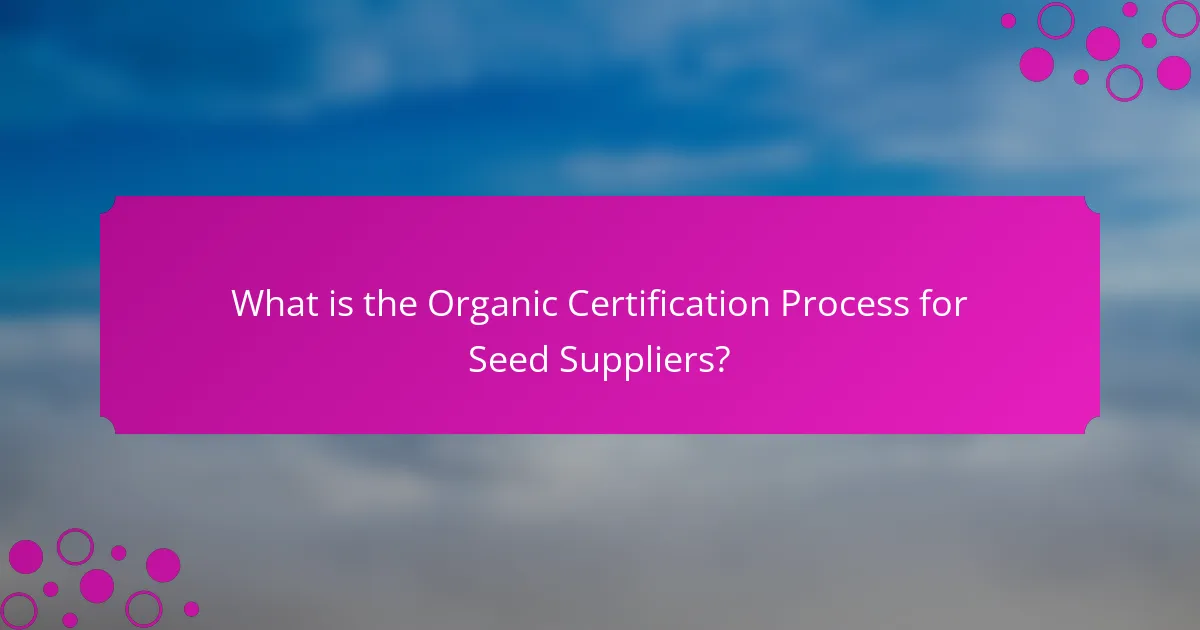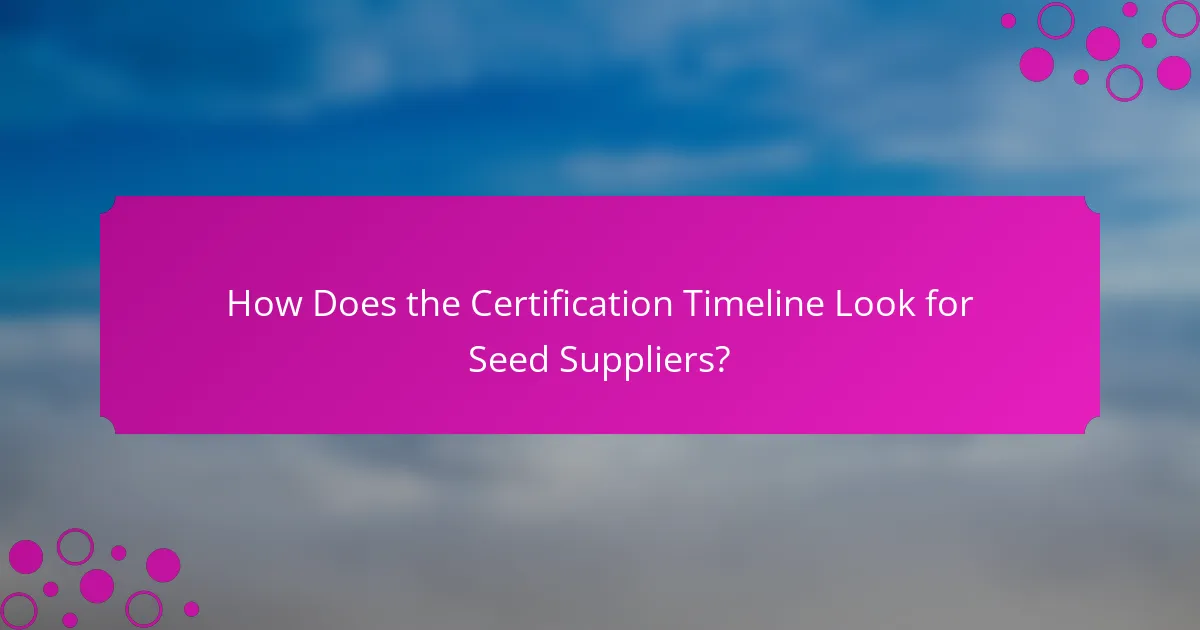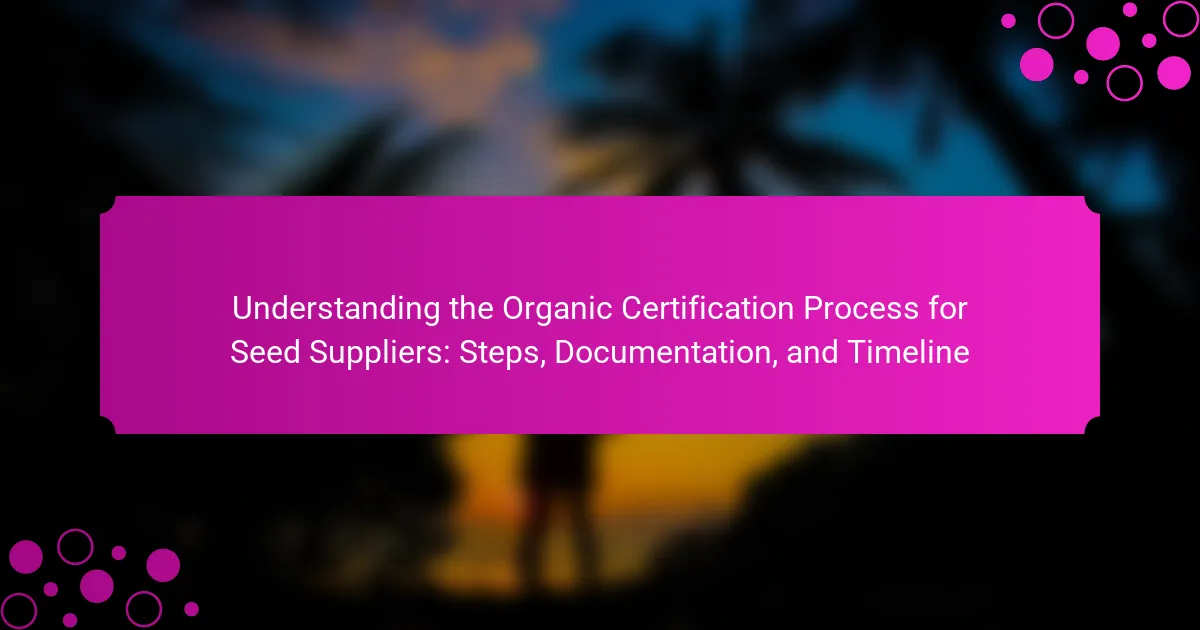The organic certification process for seed suppliers is a structured procedure that ensures compliance with USDA organic standards. Key steps include selecting an accredited certifying agent, developing an organic system plan, and undergoing an on-site inspection. Documentation plays a crucial role throughout this process, requiring suppliers to maintain detailed records of their practices and inputs. The certification timeline generally spans 3 to 6 months, involving an application, inspection, and review phases. Successful certification relies on rigorous documentation practices, staff training, and proactive communication with certifying agencies.

What is the Organic Certification Process for Seed Suppliers?
The organic certification process for seed suppliers involves several key steps. First, seed suppliers must choose a certifying agent accredited by the USDA. Next, they need to develop an organic system plan detailing their farming practices. This plan must include information on soil management, pest control, and seed sourcing.
After submitting the plan, the certifying agent conducts an on-site inspection. This inspection verifies compliance with organic standards. Following the inspection, the certifying agent reviews the findings and makes a certification decision. If approved, the supplier receives organic certification, which must be renewed annually.
Documentation is critical throughout this process. Suppliers must maintain records of all inputs and practices. These records support compliance during inspections. The entire process can take several months, depending on the certifying agent’s schedule and the supplier’s preparedness.
Why is Organic Certification Important for Seed Suppliers?
Organic certification is important for seed suppliers because it ensures compliance with organic farming standards. This certification builds trust with consumers who seek organic products. It also enhances market access, as many retailers require organic certification for products. Certified seeds typically command higher prices, benefiting suppliers financially. Additionally, organic certification promotes sustainable farming practices. It reduces the use of synthetic pesticides and fertilizers, contributing to environmental health. The USDA National Organic Program provides guidelines that seed suppliers must follow to achieve certification. This process includes rigorous documentation and inspections to verify organic practices.
What are the key benefits of being organically certified?
Being organically certified provides multiple benefits. It enhances marketability and consumer trust. Certified organic products often command higher prices. This certification can lead to increased sales and customer loyalty. It also ensures compliance with organic farming standards. Organic certification promotes sustainable agricultural practices. Additionally, it can open doors to new markets and distribution channels. Research shows that organic farming can improve soil health and biodiversity.
How does organic certification impact market access for seed suppliers?
Organic certification enhances market access for seed suppliers by validating their products’ compliance with organic standards. This certification opens up opportunities for suppliers to sell to organic farms and retailers. Many consumers prefer certified organic products, increasing demand. Certified suppliers can access niche markets that prioritize organic farming practices. Additionally, organic certification can lead to higher price points for seeds. Research indicates that organic farmers are more likely to buy from certified suppliers. A study by the USDA found that certified organic products often yield better market prices. Thus, organic certification is crucial for seed suppliers aiming to expand their market reach.
What are the General Steps in the Organic Certification Process?
The general steps in the organic certification process include application, inspection, and compliance. First, applicants submit an organic certification application to a certifying agent. This application outlines the operation and practices. Next, an inspector conducts an on-site inspection of the farm or facility. The inspector evaluates practices against organic standards. Following the inspection, the certifying agent reviews the inspector’s report. If compliant, the agent issues an organic certificate. If there are issues, the applicant must address them before certification. This process ensures adherence to the USDA National Organic Program standards.
What initial preparations are needed before applying for certification?
Before applying for certification, seed suppliers must gather necessary documentation. This includes proof of organic practices and records of inputs used. Suppliers should also assess their compliance with organic standards. Familiarity with the specific certification requirements is essential. Additionally, they need to create an organic system plan. This plan outlines their farming practices and management strategies. Finally, suppliers should conduct an internal audit to identify any gaps. This preparation ensures a smoother certification process.
How do seed suppliers select an appropriate certifying agent?
Seed suppliers select an appropriate certifying agent based on specific criteria. They assess the agent’s accreditation status with recognized organizations. Seed suppliers also consider the agent’s expertise in organic standards relevant to their products. The geographical location of the certifying agent is important for logistical reasons. Suppliers review the agent’s reputation and customer reviews. They may also look into the agent’s fees and services offered. Additionally, seed suppliers seek agents that provide clear communication and support throughout the certification process. This selection process ensures compliance with organic regulations and facilitates successful certification.
What Documentation is Required for Organic Certification?
Documentation required for organic certification includes several key elements. Seed suppliers must provide a completed application form. They need to submit a detailed organic system plan. This plan outlines practices and procedures for organic production. Records of inputs used in production must also be included. Additionally, suppliers should maintain records of sales and purchases. Documentation of compliance with organic standards is essential. Finally, an inspection report from a certified inspector is required. These documents ensure adherence to the USDA National Organic Program regulations.
What types of records must seed suppliers maintain?
Seed suppliers must maintain various types of records to ensure compliance with organic certification standards. These records include seed source documentation, which verifies the origin of the seeds. They must also keep records of seed treatments, detailing any substances applied during processing. Additionally, suppliers need to document their production practices, including planting dates and crop rotation schedules. Records of sales and distribution are essential for tracking seed movement. Furthermore, suppliers should maintain records of inspections and certifications received. These documentation practices support transparency and traceability in organic farming.
How do suppliers demonstrate compliance with organic standards through documentation?
Suppliers demonstrate compliance with organic standards through detailed documentation. They maintain records of all inputs used in organic production. This includes seed sources, fertilizers, and pest control substances. Suppliers also document their farming practices and crop rotations. Certification bodies require these records for verification. Additionally, suppliers must provide invoices and receipts for organic inputs. Compliance is further supported by third-party audits. These audits review the documentation to ensure adherence to organic standards. Accurate and complete records are essential for maintaining organic certification.

How Does the Certification Timeline Look for Seed Suppliers?
The certification timeline for seed suppliers typically spans several months. Initially, seed suppliers must complete an application process, which can take 2 to 4 weeks. Following this, an inspection is scheduled, usually within 1 to 3 months after application submission. The inspection assesses compliance with organic standards. After the inspection, the certifying agency reviews the findings, which may take an additional 4 to 8 weeks. If any issues arise, suppliers may need to address them, extending the timeline. Once approved, the certification is granted, and suppliers receive their organic certificate. Overall, the entire process can take anywhere from 3 to 6 months, depending on various factors such as the agency’s workload and the supplier’s preparedness.
What is the typical duration of the organic certification process?
The typical duration of the organic certification process is about three years. This timeframe allows for the required transition period for land to meet organic standards. During these three years, farmers must follow organic practices and maintain detailed records. Certification bodies evaluate compliance through inspections and documentation reviews. The duration may vary based on the complexity of the operation and the certifying agency’s requirements. Some farms may achieve certification sooner if they have previously followed organic practices. Overall, thorough preparation and adherence to guidelines can streamline the process.
What factors can affect the timeline for certification?
Several factors can affect the timeline for certification. The complexity of the operation plays a significant role. Larger and more diverse operations may require more extensive documentation and inspection. The readiness of the applicant impacts the timeline as well. Incomplete applications can lead to delays. The availability of certifying agents also influences the speed of the process. If agents are busy, inspections may take longer to schedule. Seasonal factors can affect when inspections occur, especially in agricultural contexts. Lastly, compliance with organic standards must be thoroughly demonstrated, which can vary in time based on the specific practices of the operation.
How can seed suppliers expedite the certification process?
Seed suppliers can expedite the certification process by ensuring thorough documentation and compliance with organic standards. They should maintain accurate records of seed sources, cultivation practices, and input materials. This helps in demonstrating adherence to regulations set by certifying bodies. Additionally, suppliers can engage with certifiers early in the process to clarify requirements and expectations. Regular communication with certifying agents can prevent misunderstandings and delays. Utilizing software for tracking and managing documentation can streamline the process further. By preparing for inspections in advance, suppliers can ensure a smoother certification experience. These strategies collectively contribute to a more efficient certification timeline.
What are the Common Challenges in the Organic Certification Process?
Common challenges in the organic certification process include complex documentation requirements. Seed suppliers must maintain detailed records of inputs and practices. Inconsistent regulations across different certifying bodies can create confusion. Additionally, the transition period for converting conventional to organic practices can be lengthy. Financial constraints may hinder compliance with certification standards. Limited access to organic seeds can also pose a challenge for suppliers. Lastly, ongoing inspections and audits may be resource-intensive and stressful. Each of these challenges can impact the ability to achieve and maintain organic certification.
What issues do seed suppliers face during the documentation phase?
Seed suppliers face several issues during the documentation phase of the organic certification process. One major issue is the complexity of regulatory requirements. Different certifying bodies have varying standards that must be met. This can lead to confusion and potential errors in documentation.
Another issue is the need for comprehensive record-keeping. Suppliers must maintain detailed records of seed sources, production practices, and inputs used. Inadequate record-keeping can result in delays or rejections of certification applications.
Additionally, seed suppliers may struggle with the lack of clarity in guidelines. Ambiguous regulations can hinder the documentation process, leading to misunderstandings. Lastly, time constraints can pose a challenge. Suppliers often face tight deadlines to gather and submit necessary documentation.
These challenges can significantly impact the efficiency and success of the organic certification process for seed suppliers.
How can seed suppliers overcome obstacles in the certification process?
Seed suppliers can overcome obstacles in the certification process by improving their understanding of the requirements. Familiarity with organic standards is crucial. Suppliers should invest in training for their staff on certification protocols. Implementing robust record-keeping systems helps maintain compliance. Engaging with certification bodies early can clarify expectations. Collaborating with other suppliers can provide shared insights and resources. Regular audits and self-assessments identify potential issues before formal evaluations. Utilizing technology for tracking and documentation streamlines the process. These strategies enhance the likelihood of successful certification.

What Best Practices Should Seed Suppliers Follow for Successful Certification?
Seed suppliers should implement rigorous documentation practices for successful certification. Accurate records of seed sources, production practices, and handling processes are essential. Suppliers must also ensure compliance with organic standards set by certifying bodies. Regular training on these standards for staff enhances adherence. Conducting internal audits can identify potential compliance issues early. Collaborating with experienced consultants can provide valuable insights into the certification process. Maintaining clear communication with certifying agencies helps address any concerns promptly. Suppliers should stay updated on changes in organic regulations to ensure ongoing compliance. Following these best practices increases the likelihood of successful certification.
How can seed suppliers prepare for their organic certification audit?
Seed suppliers can prepare for their organic certification audit by organizing their documentation and ensuring compliance with organic standards. They should maintain accurate records of seed sources, cultivation practices, and inputs used. This includes documenting any organic seeds purchased and the methods of production. Suppliers must also review their farm management plans to align with organic regulations. Training staff on organic practices is essential for consistent implementation. Conducting internal audits prior to the official audit can identify gaps in compliance. Additionally, suppliers should familiarize themselves with the certifying agency’s requirements and guidelines. This preparation increases the likelihood of a successful certification audit.
What strategies can help maintain compliance throughout the certification period?
Regular internal audits help maintain compliance throughout the certification period. Conducting audits ensures that processes align with organic standards. Documenting findings from these audits promotes accountability. Training staff on compliance requirements reinforces adherence to regulations. Maintaining accurate records of inputs and practices is essential. These records provide transparency and traceability. Engaging with certification bodies for guidance fosters a collaborative relationship. Staying updated on regulatory changes ensures ongoing compliance.
How do seed suppliers stay updated on changes in organic regulations?
Seed suppliers stay updated on changes in organic regulations through multiple channels. They regularly consult official resources such as the USDA National Organic Program website. They also participate in industry associations that provide updates and training. Attending conferences and workshops helps them network with experts and gain insights. Subscribing to newsletters from regulatory bodies keeps them informed about new policies. Engaging with other suppliers allows for the sharing of best practices and information. These methods ensure that seed suppliers remain compliant with current organic standards.
The main entity of this article is the organic certification process for seed suppliers. The article outlines the essential steps involved in obtaining organic certification, including selecting a certifying agent, developing an organic system plan, and undergoing inspections. It emphasizes the importance of documentation and compliance with USDA organic standards, detailing the required records and the challenges suppliers may face during the certification process. Additionally, the article discusses the timeline for certification, best practices for successful certification, and strategies for maintaining compliance throughout the certification period.
